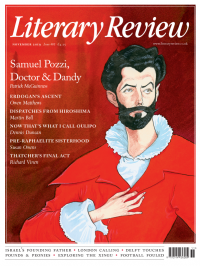Richard Bourke
Convince Me
How Words Make Things Happen
By David Bromwich
Oxford University Press 144pp £20
David Bromwich is among the most accomplished literary critics writing in the United States today. More than that, he is a major intellectual voice there. He brings considerable reserves of historical knowledge and philosophical insight to the various issues that concern him. Partly because of this, his work extends beyond the confines of any disciplinary boundary. He has written eloquently on Hazlitt, Wordsworth, Burke and Shakespeare, and has been a prominent commentator on academic and political life in America. He is a challenging and multifaceted thinker, but he is distinguished, above all, by his moral seriousness.
One of Bromwich’s staple preoccupations is on display in this short book, based on the Clarendon Lectures that he delivered at the University of Oxford in 2013. In five sharp chapters, he explores an eclectic array of writers, including poets, novelists, orators and politicians. As this list suggests,

Sign Up to our newsletter
Receive free articles, highlights from the archive, news, details of prizes, and much more.@Lit_Review
Follow Literary Review on Twitter
Twitter Feed
Under its longest-serving editor, Graydon Carter, Vanity Fair was that rare thing – a New York society magazine that published serious journalism.
@PeterPeteryork looks at what Carter got right.
Peter York - Deluxe Editions
Peter York: Deluxe Editions - When the Going Was Good: An Editor’s Adventures During the Last Golden Age of Magazines by Graydon Carter
literaryreview.co.uk
Henry James returned to America in 1904 with three objectives: to see his brother William, to deliver a series of lectures on Balzac, and to gather material for a pair of books about modern America.
Peter Rose follows James out west.
Peter Rose - The Restless Analyst
Peter Rose: The Restless Analyst - Henry James Comes Home: Rediscovering America in the Gilded Age by Peter Brooks...
literaryreview.co.uk
Vladimir Putin served his apprenticeship in the KGB toward the end of the Cold War, a period during which Western societies were infiltrated by so-called 'illegals'.
Piers Brendon examines how the culture of Soviet spycraft shaped his thinking.
Piers Brendon - Tinker, Tailor, Sleeper, Troll
Piers Brendon: Tinker, Tailor, Sleeper, Troll - The Illegals: Russia’s Most Audacious Spies and the Plot to Infiltrate the West by Shaun Walker
literaryreview.co.uk